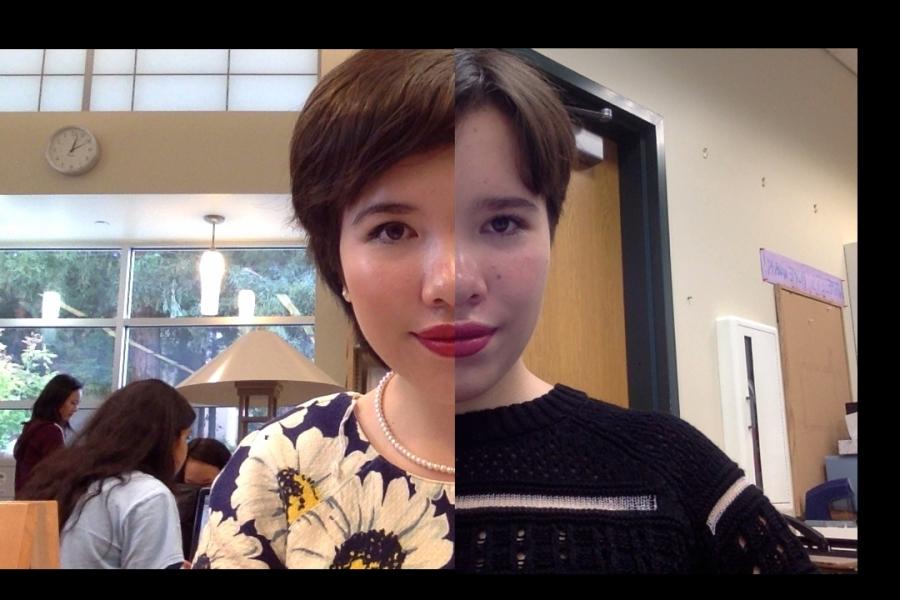Meinderings: Being wh(Asian)
Finding my biracial identity
My mother is tall, slim, with long black hair and tiny wrists. She is also Chinese.
Sometimes my mother tells me stories of the oppressive summer heat pooling into sweat stains of old T-shirts and the insensitive white classmates in their saddle shoes and Keds who yelled “Ching Chong Chinaman” across the crisping tanbark. She tells me about how she and her siblings frustrated them by pretending not to hear their taunts, later laughing at their ignorance.
As a half Chinese, half German-Irish child, I grew up around these stories, building my mother up in my mind to the likes of Rosa Parks, a brave woman standing up against oppression and triumphing against all odds. It didn’t matter what language I spoke or what color my skin was; I identified with the valiant struggle of my mother’s family, not the cartoon evil of the white bullies.
Then reality hit. After I started school, I was constantly confronted with a barrage of people who looked at my brown hair and pinkish, Irish skin and saw me as a white girl. From the Stratford pre-K where I was the sole student with any Caucasian heritage to my Crystal Children’s Choir, where the conductors teach in Chinglish, people only saw how I was different from them. “You’re white, right?” they’d say.
“I’m Chinese,” I would explain. It wasn’t that I didn’t identify as German-Irish; I was less defensive about that part of my heritage because no one questioned it.

“Do you speak Chinese?” they would ask. “Do you eat Chinese food? Have you ever been to China?” I didn’t look Chinese, I didn’t know much about Chinese culture, so how could I be Chinese?
Recently, when I was reading white privilege blogs online, I came across one talking about people of color in the media. Am I a person of color, I pondered. I wanted to know if I had the authority to speak as a “woman of color,” so I contacted the moderator of the blog and explained my situation. Eventually, she replied. “Not if you can pass as white, no.”
And there it was. In one fell swoop, my identity had been stripped away. I “passed,” so I was not a woman of color, so I was not Chinese, so I was not like my mother.
The issue of what defines white or not white is hard to talk about; it’s stooped in history and memories too painful to remember. It’s an often unspoken undercurrent that runs under everything we do, all that we say, each thought that crosses our minds. But ultimately, as difficult as it is to accept, it is a construct.
The last time my ten-year-old cousin came to visit, she had to be informed for the first time that her father, who is of British descent, is not Chinese. To everyone else, her father’s sandy hair and thin nose were clear hallmarks of a Caucasian background. To her, they were parts of her father’s face.
I have white privilege; of this I am sure. Living with pink skin and brown hair has afforded me advantages my mother never had. But it is not, cannot be accurate to say that I am not Chinese.
As the world grows smaller, already hazy ethnic lines blur into gradients. I’m not sure what defines identity, or if globalization is good, or what is politically correct, but I do know who I am. I’m half Chinese, half German-Irish, and only I can decide that.

Meilan Steimle (12) is co-Editor-in-Chief of the Winged Post. She was a reporter her freshman year, Winged Post Opinion Editor her sophomore year and Winged...


















![“[Building nerf blasters] became this outlet of creativity for me that hasn't been matched by anything else. The process [of] making a build complete to your desire is such a painstakingly difficult process, but I've had to learn from [the skills needed from] soldering to proper painting. There's so many different options for everything, if you think about it, it exists. The best part is [that] if it doesn't exist, you can build it yourself," Ishaan Parate said.](https://harkeraquila.com/wp-content/uploads/2022/08/DSC_8149-900x604.jpg)




![“When I came into high school, I was ready to be a follower. But DECA was a game changer for me. It helped me overcome my fear of public speaking, and it's played such a major role in who I've become today. To be able to successfully lead a chapter of 150 students, an officer team and be one of the upperclassmen I once really admired is something I'm [really] proud of,” Anvitha Tummala ('21) said.](https://harkeraquila.com/wp-content/uploads/2021/07/Screen-Shot-2021-07-25-at-9.50.05-AM-900x594.png)







![“I think getting up in the morning and having a sense of purpose [is exciting]. I think without a certain amount of drive, life is kind of obsolete and mundane, and I think having that every single day is what makes each day unique and kind of makes life exciting,” Neymika Jain (12) said.](https://harkeraquila.com/wp-content/uploads/2017/06/Screen-Shot-2017-06-03-at-4.54.16-PM.png)








![“My slogan is ‘slow feet, don’t eat, and I’m hungry.’ You need to run fast to get where you are–you aren't going to get those championships if you aren't fast,” Angel Cervantes (12) said. “I want to do well in school on my tests and in track and win championships for my team. I live by that, [and] I can do that anywhere: in the classroom or on the field.”](https://harkeraquila.com/wp-content/uploads/2018/06/DSC5146-900x601.jpg)
![“[Volleyball has] taught me how to fall correctly, and another thing it taught is that you don’t have to be the best at something to be good at it. If you just hit the ball in a smart way, then it still scores points and you’re good at it. You could be a background player and still make a much bigger impact on the team than you would think,” Anya Gert (’20) said.](https://harkeraquila.com/wp-content/uploads/2020/06/AnnaGert_JinTuan_HoHPhotoEdited-600x900.jpeg)

![“I'm not nearly there yet, but [my confidence has] definitely been getting better since I was pretty shy and timid coming into Harker my freshman year. I know that there's a lot of people that are really confident in what they do, and I really admire them. Everyone's so driven and that has really pushed me to kind of try to find my own place in high school and be more confident,” Alyssa Huang (’20) said.](https://harkeraquila.com/wp-content/uploads/2020/06/AlyssaHuang_EmilyChen_HoHPhoto-900x749.jpeg)



